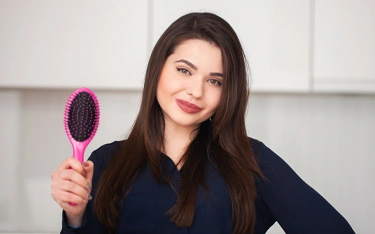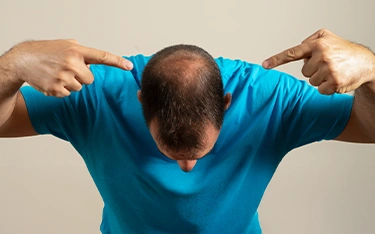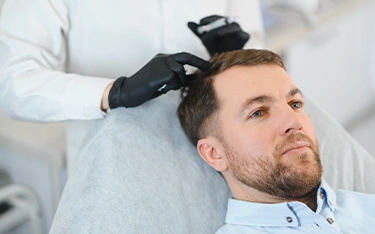Is your hair slowly disappearing, and you are not sure why?
Many people struggle with hair loss issues, often feeling frustrated, anxious, or even emotionally low when their hair starts to thin.
*67% of UAE residents have reported hair loss, with most blaming stress, poor nutrition, or even water quality. In a fast-paced city like Dubai, the heat, humidity, stressful lifestyle, and desalinated water only exacerbate the problem.
For some, it starts with extra hair strands on the pillow. For others, it is a receding hairline or thinning crown. However, there is usually a deeper cause, whether it be hereditary, hormonal, or daily habits. You should address the root cause of your hair loss and seek treatment for it as soon as possible.
This blog reveals the underlying causes of hair loss and guides you through practical steps to stop hair loss, manage and regrow hair.
Note: If you are noticing early signs of hair loss, it is best to act now. Our personalised hair loss treatment at Dr Batra’s® treats the root cause—gently and effectively.
Causes of Hair Loss in Dubai
In the UAE, hair loss often starts with what you’re exposed to everyday.
From the water in your shower to the stress at work—even your genes—multiple factors may be silently contributing.
Here’s what you should watch for:
Causes of Hair Loss in the UAE
-
Environmental Conditions
Dubai's intense heat and high humidity can cause excessive sweating on the scalp, clogging follicles and weakening roots over time. Air conditioning provides relief but often dries and irritates the scalp.
-
Water Quality
Desalinated water used in most UAE homes lacks essential minerals and may leave behind salt residue. This can dry out hair and make it prone to breakage.
-
Diet and Nutrition
Busy schedules often lead to nutrient deficiencies—especially iron, zinc, protein, and vitamin D—which are vital for healthy hair. Even local produce may lack adequate micronutrients due to soil degradation.
-
Hormonal Imbalances
Conditions like thyroid disorders, PCOS, or menopause can disrupt the natural hair growth cycle.
-
Stress
Emotional stress and physical strain (illness, surgery, fatigue) can push hair into a shedding phase, leading to telogen effluvium.
-
Harsh Hair Care Practices
Frequent heat styling, chemical treatments, and tight hairstyles can damage the scalp and hair shaft, causing breakage and weakened roots.
Natural Ways to Stop Hair Loss
Not all hair loss needs aggressive treatment. In many cases, the right daily habits can protect your scalp, strengthen your roots, and slow down hair shedding. These consistent small changes can make a big difference.
Here are some simple, effective practices to control hair loss:
-
Scalp and Hair Hygiene
Clear scalp is necessary for healthy hair. Sweat, oil, and product build-up can clog follicles and lead to hair thinning over time.
- Wash your hair 2–3 times a week with a mild, sulphate-free shampoo that suits your scalp type.
- Avoid hot water—it dries out the scalp. Use cool or lukewarm water instead.
-
Handle Hair Gently
Wet hair is fragile. Combing or tying it immediately after washing can lead to breakage and root damage.
- Let your hair air-dry naturally before brushing.
- Use a wide-tooth comb to reduce pulling and hair fall.
-
Scalp Massage
Massaging the scalp stimulates blood flow, boosts circulation, and nourishes the hair roots. It also helps reduce stress.
- Use light pressure and massage your scalp with coconut, castor, or almond oil twice a week.
- Leave the oil overnight or for a few hours before washing for best results.
-
Eat Right and Move More
A healthy diet and regular movement support better hair growth. Nutrients like biotin, iron, zinc, and protein are essential.
- Include eggs, leafy greens, seeds, lentils, and seasonal fruits in your meals.
- Practice yoga or go for a walk—physical activity helps reduce stress-related hair fall.
-
Stay Hydrated
Dehydration affects your scalp, too. A dry scalp leads to itching, flaking, and weaker roots.
- Aim to drink at least 8–10 glasses of water daily.
- Include hydrating foods like cucumbers, oranges, and watermelon.
-
Cut Down on Harmful Habits
Smoking and excessive caffeine or alcohol can affect blood circulation and slow down hair growth.
- Try cutting back gradually. Even small reductions can help improve scalp health.
-
Manage Stress Naturally
Chronic stress is one of the most overlooked causes of hair loss. It disrupts the growth cycle and leads to sudden shedding.
- Make time for relaxation—whether it’s meditation, journaling, or simply switching off for a while.
- Deep breathing exercises can help calm the nervous system in just a few minutes.
-
Take a Good Night Sleep
Sleep is when your body resets, repairs, and regenerates—and that includes your hair. Poor sleep disrupts hormone levels and increases stress, both of which can contribute to hair loss.
- Aim for 7–8 hours of quality sleep every night. Try limiting screen time before bed and maintaining a consistent sleep schedule.
-
Switch to a Microfiber Towel
Regular towels can be too rough on wet hair, causing breakage and frizz. A microfiber towel absorbs excess water without pulling or damaging the strands.
- After washing your hair, gently wrap it in a microfiber towel to dry. Avoid rubbing the hair harshly.
-
Use a Wooden Comb
Plastic combs can create static, tug at hair, and damage the cuticle layer. Wooden combs are gentler on the scalp and aid in distributing natural oils evenly through the hair.
- Use a wide-tooth wooden comb, especially if you have curly or fragile hair. It reduces breakage and improves scalp circulation.
These natural lifestyle changes can help control hair fall, but they cannot treat the root cause.
That’s where homeopathic treatment steps in. It works alongside these habits to treat the internal imbalances causing hair loss, offering a natural, long-term, side-effect-free solution.






